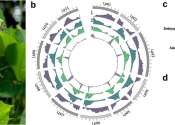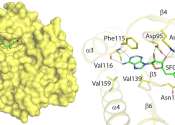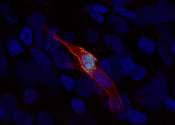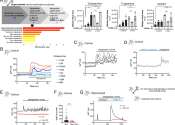Planetary Sciences
Atmospheric oxidation and the creation of modern Mars
Like Earth, Mars was formed about 4.5 billion years ago, but its early surface was very different than today's. Mars' surface then had high rates of meteorite and asteroid impacts from the period known as the Late Heavy Bombardment. ...
9 hours ago
0
119
Evolution
Scientists discover one of the Earth's earliest animals in Australian outback
In the shadow of South Australia's largest mountain range beneath the outback soil lies a fossil record that reveals a rich history of life on Earth. Fossils found at Nilpena Ediacara National Park preserve a pivotal moment ...
6 hours ago
0
60

Archaeologists discover Armenia's oldest church
Archaeologists from the National Academy of Sciences of Armenia and the University of Münster have discovered the remains of a previously unknown early Christian church in the ancient ...
Archaeologists from the National Academy of Sciences of Armenia and the University of Münster have discovered the remains of a previously unknown early ...
Archaeology
2 hours ago
1
5

Ant–plant symbiosis study finds climate change may be destabilizing mutualistic relationships
A new North Carolina State University study finds that climate change could be destabilizing the mutualistic relationships between insects and plants. The findings, appearing in the ...
A new North Carolina State University study finds that climate change could be destabilizing the mutualistic relationships between insects and plants. ...
Plants & Animals
3 hours ago
0
215

Invasive seaweed may better adapt to changes than native species in Hawaii waters
If you traverse some of Hawaiʻi's shorelines (specifically Oʻahu's south and east shores, parts of Maui and Hilo) and notice seaweed in the water, chances are they could be invasive ...
If you traverse some of Hawaiʻi's shorelines (specifically Oʻahu's south and east shores, parts of Maui and Hilo) and notice seaweed in the water, chances ...
Ecology
2 hours ago
0
3

Study explores the physical origin of errors in a spin qubit processor
To achieve remarkable performances, quantum computing systems based on multiple qubits must attain high-fidelity entanglement between their underlying qubits. Past studies have shown that solid-state quantum platforms—quantum ...

Asteroid-sample return mission enables researchers to conduct largest geophysical observation campaign of its kind
The OSIRIS-REx project made history last year as the first U.S. mission to bring back an asteroid sample from space—and with it came a treasure trove of data. An international collaboration, led by Sandia National Laboratories ...
Planetary Sciences
3 hours ago
0
24

Chinook salmon face unprecedented habitat challenges due to human-driven changes, research suggests
Chinook salmon are facing unprecedented challenges as their once-thriving populations struggle to survive. A new study published in the journal Ecosphere suggests that decades of human activities, including ocean harvest, ...
Plants & Animals
4 hours ago
0
0

Earthquake fault friction's dependence on temperature different from previously thought
Earthquake researchers believed for decades that rock friction within fault lines follows a simple relationship with temperature.
Earth Sciences
4 hours ago
0
29

New behavioral signature could help quantify the value that people attribute to specific interpersonal relationships
During their lives, humans and other mammals tend to bond in different ways with others. Psychological theories suggest that individual humans attribute varying values to their social experiences, yet the values they assign ...

Both low and high folate levels during pregnancy linked to increased heart defects in babies
Pregnant women with either low or excessively high levels of folate in their blood may face a greater risk of their children developing congenital heart disease, according to a study from Guangdong Provincial People's Hospital, ...

AI-trained vehicles can adjust to extreme turbulence on the fly
In nature, flying animals sense coming changes in their surroundings, including the onset of sudden turbulence, and quickly adjust to stay safe. Engineers who design aircraft would like to give their vehicles the same ability ...
Automotive
2 hours ago
0
0

Ancient 3D paper art, kirigami, could reshape modern wireless technology
The future of wireless technology—from charging devices to boosting communication signals—relies on the antennas that transmit electromagnetic waves becoming increasingly versatile, durable and easy to manufacture. Researchers ...
Telecom
6 hours ago
0
51

The Future is Interdisciplinary
Find out how ACS can accelerate your research to keep up with the discoveries that are pushing us into science’s next frontier
 Medical Xpress
Medical Xpress

Clinical trials confirm zolbetuximab's efficacy in gastric cancer

New clinical model for predicting hip fractures could save lives

Six proteins may hold key to diagnosing early-onset preeclampsia

Emergency medical department study reveals half of all patients with sepsis die within two years

Enhancing MRI with AI to improve diagnosis of brain disorders

Smaller vial size for Alzheimer's drug could save Medicare hundreds of millions per year

Controlled trial shows hearing and vision health support vital in dementia care

Researchers create 'mini brains' to model Lewy body dementia and pinpoint treatments

GLP-1 weight-loss meds won't raise teens' suicide risk, may even lower it

Integrating machine learning with statistical methods enhances disease risk prediction models

Why people think they're right, even when they are wrong

Researchers publish results of largest ever study on British South Asian maternal mental health

Intergenerational unfairness could worsen youth mental health
 Tech Xplore
Tech Xplore

Research team develops key n-type thermoelectric semiconductor technology to recycle waste heat

New tool can detect malware on Android phones

Volunteers bring solar power to Hurricane Helene's disaster zone

Integer addition algorithm could reduce energy needs of AI by 95%

Changing OpenAI's nonprofit structure would raise questions about its future

Documents show OpenAI's long journey from nonprofit to $157B valued company

NASA launches probe to study if life possible on icy Jupiter moon
NASA's Europa Clipper probe blasted off from Florida on Monday, bound for an icy moon of Jupiter to discover whether it has the ingredients to support life.
Space Exploration
4 hours ago
0
34

LIGO team enhances gravitational wave detection with squeezed light
A team of researchers at the Laser Interferometer Gravitational-Wave Observatory (LIGO), in the U.S., has developed what they describe as a squeezed light system to improve detection sensitivity.

Gene therapy that converts omega-6 to omega-3 fatty acids in the body could combat effects of childhood obesity
According to the Centers for Disease Control, nearly 20% of children and teens are considered obese. Research shows it can have a dramatic impact on a variety of health conditions, including arthritis, heart conditions and ...
Pediatrics
4 hours ago
0
0

New salicylic acid-based strategy could balance disease resistance with plant growth
Researchers at the University of Georgia have identified a promising approach to addressing a longstanding challenge for plant geneticists: balancing disease resistance and growth in plants.
Biotechnology
4 hours ago
0
3

Study reveals plants have mechanism for protein blueprint monitoring that was thought to exist only in animal cells
Plants have a sophisticated mechanism for monitoring the production of new proteins. The U1 snRNP complex ensures that the protein blueprints are fully completed. This is important because cells tend to halt the process prematurely. ...
Plants & Animals
4 hours ago
0
21

New measuring method determines how immune cells really migrate
In order to reach their target, for instance a tumor, immune cells have to leave the bloodstream or lymphatic vessels and migrate through connective tissue. Until now, scientists presumed that immune cells migrated through ...
Molecular & Computational biology
4 hours ago
0
4

Swamps on the silver screen mirror our feelings on wetlands, researchers find
Maybe you've seen the meme. Classic film characters up to their necks in muck, with text reading, "As a kid, I thought quicksand was going to be a much bigger problem in my life." Quicksand was an uncannily common plot point ...
Ecology
4 hours ago
0
26

More housing in cities is possible without sacrificing green spaces, sustainable development study finds
By 2050, the Netherlands will need nearly two million additional homes. However, housing and related utility buildings take up already limited space, and the materials required for construction also have an environmental ...
Environment
4 hours ago
0
24

Adverse effects found following faricimab treatment for eye conditions
Researchers led by the University Hospital Zurich have identified cases of sterile intraocular inflammation, including severe retinal vasculitis, associated with faricimab injections used to treat eye conditions including ...

Expansion in situ genome sequencing innovation makes hidden DNA-protein interactions visible
Harvard scientists have unveiled a new technique called expansion in situ genome sequencing (ExIGS) that combines existing in situ genome sequencing (IGS) with expansion microscopy (ExM). The innovation allowed researchers ...

Beyond the toxin: Investigating the role of the cpb2 gene in the survival of Clostridium perfringens
Clostridium perfringens (C. perfringens) is a widespread bacterium found in the intestines of animals and humans, known for causing severe enteric diseases. It produces over 20 toxins, with the β-2 toxin (CPB2) being linked ...

Transparency and trust: How news consumers in Canada want AI to be used in journalism
When it comes to artificial intelligence (AI) and news production, Canadian news consumers want to know when, how and why AI is part of journalistic work. And if they don't get that transparency, they could lose trust in ...

Millions of new discoveries are published every year, but this explosive research growth wasn't what experts predicted
Millions of scientific papers are published globally every year. These papers in science, technology, engineering, mathematics and medicine present discoveries that range from the mundane to the profound.

More must be done in Ghana to stop households from using firewood, say researchers
Cooking on firewood and coal increases air pollution and ill health. Some of the dangers include stunted growth in children and undernutrition in children and adults. Babies who've been exposed to charcoal and firewood smoke ...

When AI plays favorites: How algorithmic bias shapes the hiring process
A public interest group filed a U.S. federal complaint against artificial intelligence hiring tool, HireVue, in 2019 for deceptive hiring practices. The software, which has been adopted by hundreds of companies, favored certain ...

No country still uses an electoral college—except the US
The United States is the only democracy in the world where a presidential candidate can get the most popular votes and still lose the election. Thanks to the Electoral College, that has happened five times in the country's ...

Q&A: Devastating hurricanes don't dramatically change how people vote, but it can matter in a close election
North Carolina and Florida are changing administrative rules and, in some cases, issuing emergency funding that is intended to make it easier for people in areas damaged by Hurricanes Helene and Milton to vote.

Car sharing and second-hand phones not as green as they seem, research shows
Not all sustainable business models have the impact they claim, Leiden researcher Levon Amatuni revealed. Car sharing and phone reuse, for example, have a smaller positive effect than previously thought. Amatuni advises people ...

Too many kids face bullying rooted in social power imbalances, and educators can help prevent this
Being at school among peers and friends can be exciting and positive for many children and youth. But, too many kids in Canada face the reality of being bullied because of some aspect of who they are.

Study identifies role of Indian summer monsoon in global weather patterns to improve climate models
A new study has made important strides in understanding a key teleconnection pattern, namely, the circumglobal teleconnection (CGT) pattern, and emphasizes the role of the Indian summer monsoon in improving the representation ...

Disruption or adaptation: Three questions for the right digitalization strategy
Does every company need to focus on disruption with its digital strategy or should it wait for disruptions from others before reacting and adapting its processes? A new study by Jan Recker, Murat Tarakci and Fabian J. Sting ...

Research finds homeowners use credit strategically to recover from hurricanes
A massive storm can instantly sweep away someone's dream home, as we've seen recently with Hurricane Helene and now Hurricane Milton. Millions in the Southeast have had their homes destroyed or damaged by these devastating ...

Study find high occurrence of PFAS in biofilters for stormwater treatment
In collaboration with researchers at Ohio State University and the Swedish construction company NCC, researchers in Urban Water Engineering at Luleå University of Technology have conducted a comprehensive study on the occurrence, ...

Red clover seed oil rich in bioactive compounds, study finds
A research team has identified a wealth of bioactive compounds in red clover (Trifolium pratense) seeds and their oil, positioning them as a promising source for functional ingredients in food and health care products. Researchers ...

Researchers develop efficient paired electrolysis system to produce formic acid from CO₂ and methanol feedstocks
In a study published in Angewandte Chemie International Edition, researchers developed an acid/alkali asymmetric electrolyzer for acidic CO2 reduction reaction (CO2RR) coupled with alkaline methanol electrooxidation (MOR) ...

Observing the mechanism of protonation site switching in hydrated nicotine
Proton transfer is central to numerous important systems, from biology to energy storage. Probing the details of proton transfer reactions can provide insight into how to control these processes.

Compounds from Mitragyna diversifolia harbor antidiabetic and antioxidant potential
Mitragyna diversifolia is an evergreen shrub or small tree that grows up to 5 m in height, found in moist and wet forests, as well as in disturbed habitats. Available phytochemical studies suggest that the main constituents ...

New report tackles barriers that face migrant children with disability
A new report has revealed the obstacles facing migrant and refugee children with disability and their caregivers, and the way they impact their well-being.

Godzilla at 70: The monster's warning to humanity is still urgent
The 2024 Nobel Peace Prize has been awarded to Nihon Hidankyo, the Japan Confederation of A- and H-bomb Sufferers Organizations. Many of these witnesses have spent their lives warning of the dangers of nuclear war—but initially, ...

Can listening to music make you more productive at work?
Listening to music can enhance our lives in all kinds of ways—many of us use it during exercise, to regulate our mood, or in the workplace.

































































